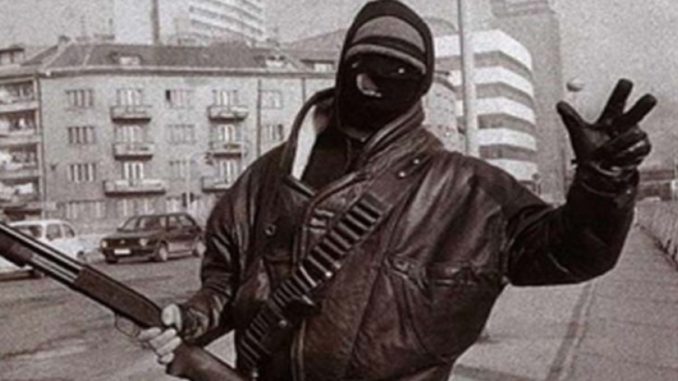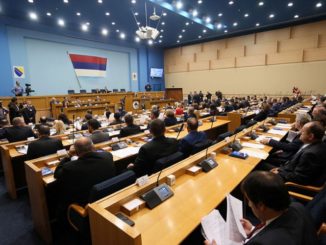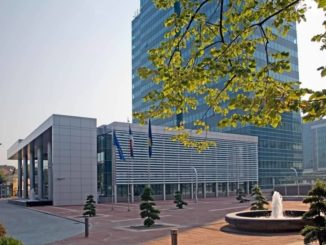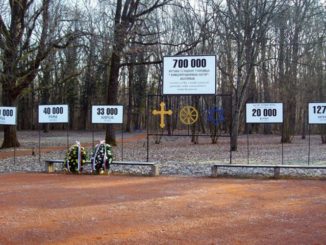
‘A democratic reply to undemocratic pressures.’ This is how Radovan Karadžić’s party characterised the referendum it organised in Bosnia in November 1991. The anti-democratic measure, as they saw it, was the majority vote by the then Assembly of the Socialist Republic of Bosnia-Herzegovina declaring Bosnia a sovereign republic within its existing borders. Karadžić had a legal case for lodging a complaint against this vote but instead his party upped the ante, abandoned the Assembly and organised a mono-ethnic referendum outside the existing legal structures of the republic. In this, ethnic Serb voters were asked if they wanted Socialist Bosnia to remain within the then Socialist Federal Republic of Yugoslavia or not. Non-Serb Bosnians could, in theory, also vote but on separate, differently coloured ballot papers. Few bothered.
The terms and legacy of Karadžić’s ploy in November 1991 are worth recalling as another referendum gambit plays itself out this weekend in Crimea. The essential formula for modern day secessionism is as follows:
(i) assert a claim of victimhood as a result of outrageous acts perpetrated by an oppressor;
(ii) represent one’s own acts as a ‘legitimate response’ to the oppressor’s acts. Here a self-organised referendum is desirable because it appears democratic;
(iii) proclaim, thereafter, in a local assembly, a unilateral declaration of independence (UDI) based on a ‘right to self-determination.’
Karadžić’s party’s claim of victimhood was based on political hysteria, not hard evidence of oppression.
While the formula is fairly clear, the details and improvisations around it matter a great deal in assessing legitimacy. The interstate system and international law are, as a rule, strongly opposed to secessionism. But the empirical circumstances of oppression and response do matter. Karadžić’s party’s claim of victimhood at the hands of Croatian ‘fascists’ and ‘Muslim fundamentalists’ was, for example, based on political hysteria, not hard evidence of oppression. Neighbouring Serbian strongman Slobodan Milošević facilitated Karadžić’s ‘democratic reply’ and it became the self-legitimating justification for Karadžić to proclaim a Serbian Republic within Bosnia-Herzegovina. This move pre-emptively sabotaged an internationally sanctioned referendum on Bosnia’s independence in the spring of 1992. At the very moment Bosnia was acquiring recognition as an independent state, it came under attack by those who viewed it an ‘artificial country.’ Horrific war crimes and acts of genocide followed, in Bosnia and later in Kosovo. It was the latter, following on from years of oppression, which finally precipitated NATO intervention, international occupation, stalemated negotiations and, in the end, a UDI by Kosovo’s democratically elected leadership. That so many states chose to recognize Kosovo is a mark of the persuasiveness of ‘remedial secession’ as a doctrine in the Kosovo case, and the government’s ‘earned sovereignty’ over nearly a decade.
Bosnia then, Ukraine now
The crisis in Ukraine over Crimea has uncomfortable echoes of the long dissolution of Yugoslavia. Though Ukraine has been a recognised independent state for over twenty years, Russian President Vladimir Putin reportedly regards it as a ‘cobbled together country.’ Even more blatantly than Milošević, he has intervened with Russian military forces to pre-emptively protect the local ethnic Russian population from a supposed ‘fascist’ threat (though there is no evidence of ethnicised violence). Sponsoring a local strongman as the new prime minister of Crimea, Russian forces have engineered an extra-legal referendum on 16 March, to give a democratic imprimatur to Russia acquiring Crimea.
The crisis in Ukraine over Crimea has uncomfortable echoes of the long dissolution of Yugoslavia.
Like Karadžić’s gambit, the move is deeply polarising, exploiting local ethnic factors to serve a larger geopolitical goal. While ethnic Russians are a majority in Crimea, not all necessarily see themselves as pro-Russia and anti-Ukraine. Russian ethnicity and language primacy does not mean dis-identification with Ukraine. The Russian invasion and referendum, however, is forcing a binary choice on residents, a choice depicted in stark terms on at least one referendum poster as one between Russia and Nazism. Crimean Tatar leaders, recognizing the geopolitical coercion behind an ostensibly democratic procedure, are calling for a boycott of the referendum.
It is unclear what will happen if the Crimea referendum goes ahead as planned. Two status options are possible, should, as is expected, those who vote repudiate Ukraine. The first is the choice presented on the current ballot, namely that Crimea be ‘re-united with Russia as part of the Russian Federation.’ The ‘re-united’ frame primes voters to view Crimea as natural Russian territory, as if a nostalgic past overrules and negates the present. The Russian Federation has to officially accede to this outcome. Should this not happen immediately, Crimea may join the ranks of post-Soviet de facto states.
It is delusional to believe that countries can be dismembered without the use of violence.
Will Putin take Crimea?
Public opinion surveys my colleagues and I have conducted over the last few years in Transnistria, Abkhazia and South Ossetia reveal residual Russian residents in these territories to be deeply regretful about the collapse of the Soviet Union, trusting of the Russian leadership, and supportive of local Russian troop presences. Only amongst ethnic Abkhazians , and Georgians in Abkhazia, is there an aspiration for a future other than integration into the Russian Federation. In the past, Russia has wisely refrained from openly flouting international law by annexing these, de jure respectively Moldovan and Georgian, territories. If it takes Crimea from Ukraine, however, we are in a new era.
The Bosnian precedent does not bode well for the future in and beyond Crimea. It is delusional to believe that countries can be dismembered without the use of violence. Making Republika Srpska a material reality within the territory of Bosnia-Herzegovina inaugurated waves of ethnic cleansing across the country and a new political economy based on violence, theft and ethno-party rule. As a founding father, Karadžić grew rich from criminal accumulation and war crimes. Weekend warriors from Serbia descended upon Bosnian homes, looting, pillaging and killing. Before the war there were no ‘Serb territories’ in Bosnia, just as there are no ‘Russian territories’ in Southern and Eastern Ukraine. But during the war the unleashing of gangs with guns destroyed the idea of Bosnia as a multiethnic and multicultural country. This is the nightmare facing certain regions of Ukraine. It could begin in Crimea this Sunday. Let’s hope crisis diplomacy stops this speeding train before it is too late.( www.opendemocracy.net)
About Gerard Toal
Gerard Toal (Gearóid Ó Tuathail) is Professor of Government and International Affairs at Virginia Tech’s National Capital Region campus. He is the co-author of Bosnia Remade: Ethnic Cleansing and its Reversal (Oxford, 2011).



